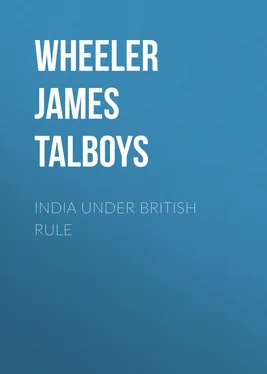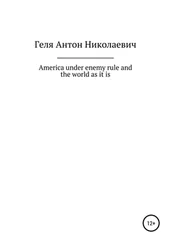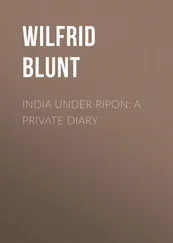Origin of the Mahratta power.
§11. Meanwhile the British had been drawn into a war with the Mahrattas. For a hundred years the Mahrattas had been the terror of India. Between 1660 and 1680, Sivaji, the hero of the Mahrattas, founded the Mahratta kingdom in the Western Deccan, between Surat and Goa. The head-quarters of the family of Sivaji had been at Poona, about seventy miles to the south-east of Bombay, and Sivaji's early life and exploits were associated with Poona. Subsequently, in consequence of Mogul aggressions, the Mahratta capital was removed to Satara, about seventy miles to the south of Poona.
Rise of the Peishwas, 1748.
In 1748 there was a revolution. The last descendant of Sivaji was shut up in a fortress at Satara, whilst the Brahman minister, known as the Peishwa, removed to Poona, the ancient seat of Sivaji's family, and cradle of his dynasty. The imprisonment of the sovereign at Satara, and the reign of a Brahman minister at Poona, hardened into an institution; and whenever a Peishwa died, his successor went to Satara to be invested with the office of minister by his imprisoned sovereign. 14 14 Two centuries have passed away since the death of Sivaji, yet in June, 1885, a public meeting was held at Poona to take steps for repairing his tomb. His admirers styled him the Wallace of the Deccan.
Peishwa and his feudatories: Sindia, Holkar, &c.
The Mahratta kingdom covered the greater part of the area of the Mahratta-speaking people. But the Peishwa sent his lieutenants to collect chout, or black-mail, in Northern India; and one of these lieutenants, Mahadaji Sindia, became a greater man than his master. Sindia always professed to be the loyal servant of the Peishwa, and yet he managed to exercise a commanding influence at Poona. It was Mahadaji Sindia who carried off the Great Mogul to Delhi in 1771 and established a dominion in Hindustan, extending from the Gwalior territory northward over the valleys of the Jumna and Ganges. The other lieutenants were only beginning to play their parts in history; they included Holkar of Indore, the Gaekwar of Baroda, and the Bhonsla Raja of Berar in the Deccan, immediately to the northward of the Nizam.
British relations with Berar.
Very soon after the battle of Plassy, the British at Calcutta came into contact with the Bhonsla Raja of Berar. It was the Bhonsla Raja who compelled the later Nawabs of Bengal to pay chout, and to cede Cuttack; and when Lord Clive had concluded his settlement with the Great Mogul and the Nawab Vizier of Oudh, he advised the Court of Directors to pay chout on condition of getting back Cuttack. But the Directors did not want Cuttack and would not pay black-mail; and the Bhonsla Raja pressed his demand at convenient intervals, but wisely abstained from invading the Bengal provinces.
Bombay and the Peishwas.
Meanwhile, the British at Bombay had come into contact with the Mahrattas at Poona. For years the East India Company had been anxious to hold two important positions close to Bombay harbour, namely, the little island of Salsette and the little peninsula of Bassein. But the Mahrattas had wrested Salsette and Bassein from the Portuguese, and would not part with them on any terms. A civil war, however, had broken out in the Mahratta country. A Peishwa had been murdered. An uncle ascended the throne, but was banished on suspicion of being the murderer. He applied for help to the British at Bombay, and offered to cede the coveted positions if the British at Bombay would restore him to the Mahratta capital. The Governor and Council at Bombay closed with the offer, and the war began.
Disastrous retreat.
After some successes, the British at Bombay met with disaster. Mahadaji Sindia appeared at Poona with a large army to act against the banished Peishwa. A British force advanced from Bombay towards Poona, but took alarm at the report of Sindia's army, and suddenly halted, and beat a retreat. During the return march, the British force was environed by the Mahrattas, and finally surrendered to Sindia under what is known as the "Convention of Wurgaum."
Success of Warren Hastings.
Warren Hastings condemned the war from the outset; as, however, the Company was committed to a war, he exerted himself, in the teeth of Francis, to maintain British prestige in India. He sent an expedition, under Colonel Goddard, from Bengal to the Mahratta country, and detached another force under Captain Popham to capture Sindia's fortress at Gwalior. The success of these exploits electrified half India. The war was brought to a triumphant close, but all conquered territories, excepting Salsette and Bassein, were restored to the Mahrattas. Indeed, Warren Hastings was not a conqueror like Clive; he acquired no territory during his régime, excepting that of Benares, which was ceded to the Company by the Nawab Vizier of Oudh.
Three Asiatic powers in India.
§12. During the Mahratta war secret negotiations were carried on between the Indian powers for a confederation against the British. The two great powers of the Deccan—the Mahrattas on the west representing the Hindus, and the Nizam on the east representing the Mohammedans—had hated one another for the greater part of a century. A third power, that of a Mohammedan adventurer named Hyder Ali, was becoming formidable further south on the western tableland of the peninsula. Hyder Ali is said to have once served as a sepoy in the French army. Later on, he entered the service of the Hindu Raja of Mysore, and eventually ousted the Raja, usurped the sovereign authority, and conquered the countries round about.
Hyder Ali of Mysore.
For many years Hyder Ali was the Ishmael of the Deccan and peninsula. His hand was against every man, and every man's hand was against him. He invaded alike the territories of the Mahrattas and the Nizam in the Deccan, and those of the Nawab of the Carnatic up to the suburbs of Madras and Fort St. George. At the same time, he more than once exasperated the British by his secret dealings with the French at Pondicherry.
Invasion of the Carnatic, 1780: breaking up of the confederation.
About 1779 Warren Hastings was warned that the three powers—the Mahrattas, the Nizam, and Hyder Ali—were preparing for simultaneous attacks on Bengal, Bombay, and Madras, and that a large Mahratta army was already on the move from Berar territory for the invasion of the Bengal provinces. In 1780 Hyder Ali desolated the Carnatic with an army of a hundred thousand men, but he was the only one of the three allies that kept to his engagement, and was eventually driven back by Sir Eyre Coote, one of the half-forgotten warriors of the eighteenth century. The Nizam did nothing; he probably waited to see what the others would do. The Mahrattas of Berar encamped in great force in the hills and jungles of Orissa, but only appear to have wanted a money present; and after wasting several months they were induced by Warren Hastings to return to Berar. No movement of any kind was undertaken against Bombay; and thus the strange confederation of Mohammedans and Mahrattas melted away.
Parliament interferes.
§13. The quarrels, the wars, and the irregularities of Warren Hastings induced the British Parliament to attempt radical changes. The antagonism between Philip Francis and Warren Hastings had led to a duel, in which Francis was wounded; and he returned to England to pour his bitter prejudices against Warren Hastings into the ears of Burke and Fox. The result was that a bitter animosity was excited, not only against Warren Hastings, but against the East India Company; and Parliament was called upon to decide whether the control of the administration of British India ought not to be transferred from the Court of Directors to the British Crown. The main question was one of patronage. The patronage of Indian appointments would render the Crown too powerful, as the elder Pitt had foreseen in the days of Clive; and George III. was already straining his royal prerogative over Parliament and Ministers to an extent which was exciting alarm.
Читать дальше












